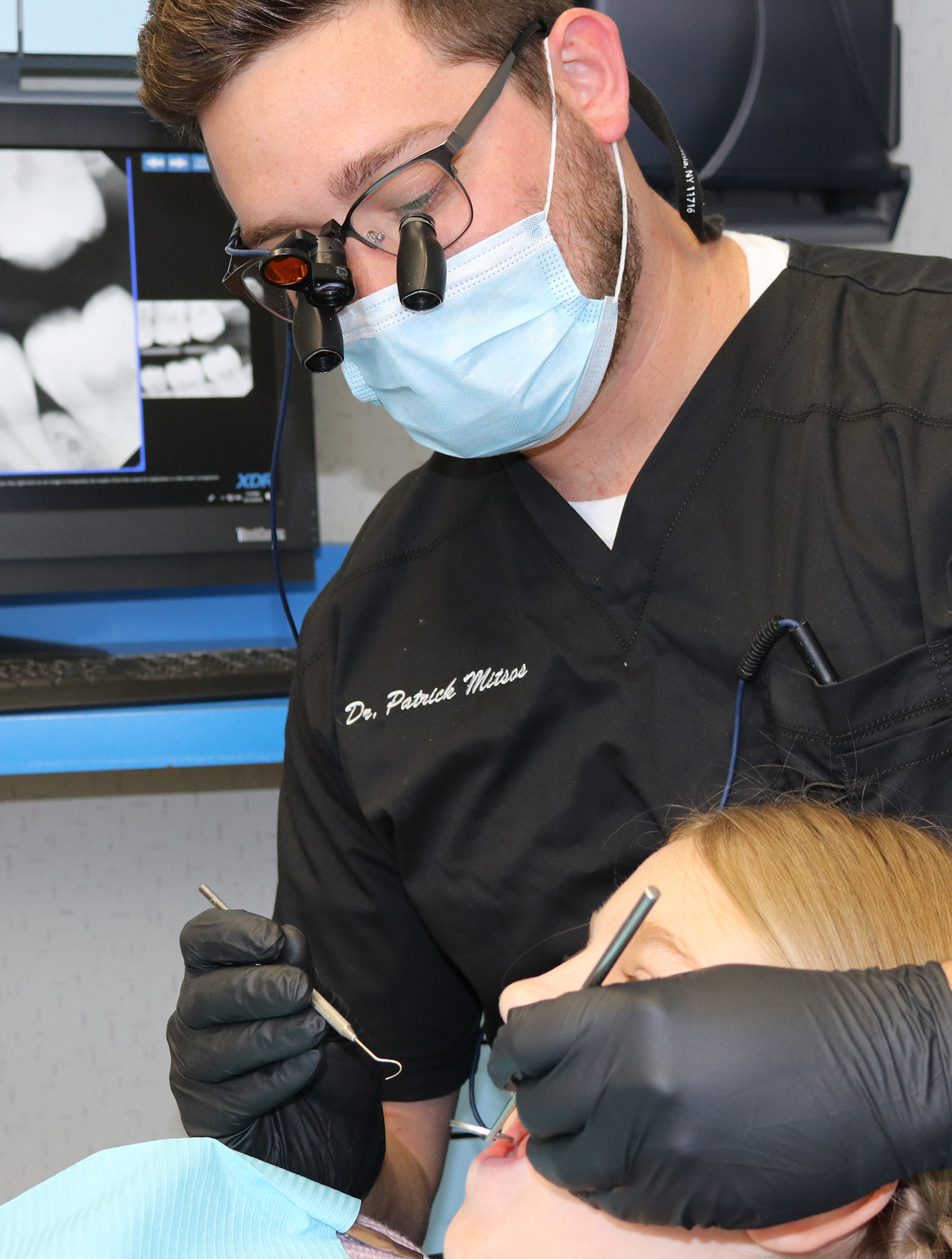A Brighter Dental Experience
General, Cosmetic, and Restorative Dentistry

Call Our Office
(708) 479-2203 | Mokena, IL
Office Location
11244 W. LaPorte Rd., Mokena, IL
Email Us
FrontDesk@VCDental.com
Welcome to Valley Creek Family Dental!
Dr. Mitsos and his staff are committed to providing comprehensive dental care for the entire family. We strive to create a relaxing and friendly atmosphere while providing evening and Saturday hours to meet your busy schedule. Dr Mitsos is committed to all modern technologies and maintains the highest levels of infection control to better serve his patients. Our office is conveniently located in the heart of Mokena, on La Porte Road just west of Wolf Road. We look forward to seeing you soon!
Contact us today at (708) 479-2203 for an emergency appointment.
Emergency Dentistry
Dr. Mitsos makes every effort to make himself available to treat emergencies for both existing patients and new patients both during and outside normal office hours. Contact us now! (708) 479-2203
New Patient Information
We look forward to working with you for all of your dental needs. We are committed to helping you have healthy teeth and a beautiful smile. Please CLICK HERE to learn more about what to expect before your first visit with us.
Meet Our Team
Our caring team of dental professionals is devoted to helping you enjoy good oral health and a beautiful smile throughout your entire life. CLICK HERE to meet us!
Our Services
Practice History Dr. Mitsos took over the practice in 2017 from Dr. Paul Homerding, who had been practicing in Mokena for 41 yrs. In 2019, Dr. Mitsos moved his Tinley Park practice to the Mokena location where he plans to stay for the rest of his career.
Remember the Basics
Don’t rush when you brush!
Brushing your teeth properly should take a full 2 minutes.
Visit your Dentist every 6 months
Seeing your Dentist on a regular basis decreases your chances of large, expensive dental procedures
Don’t Forget to Floss!
Cleaning between your teeth is just as important as brushing the parts you can see!
Dr. Patrick Mitsos
Dr. Patrick Mitsos was born and raised right here in Tinley Park. He is thrilled to be able to return to his hometown and serve the community he grew up in with exceptional dental care. Dr. Mitsos takes pride in ensuring that his patients have a comfortable experience in his office while he cares for their dental needs. He treats every patient with the same honesty and compassion that he would treat his own family members.
Learn more about Dr. Patrick Mitsos and his awesome staff by clicking the Learn More button!
Dr. Patrick Mitsos
Dentist
Dental Care for The Whole Family
Dr. Mitsos cares for patients of all ages… from Children to Grandparents!
Adult Care
Child Care
Elderly Care
We are A Full Service Dental Practice
We pride ourselves on offering the best dental care available and going that extra mile for our patients. If you are looking for a dentist who can provide general dentistry, teeth whitening, crowns, veneers, implants or Invisalign, Valley Creek Family Dental can provide you with the care you need. We take pride in providing the highest level of care to every member of your family.
Frequently Asked Questions
When should I take my child for his/her first check-up?
In order to prevent dental problems, your child should the dentist when the first tooth appears. or no later than his or her first birthday. Dr. Mitsos will make sure everything is developing proper and we will begin to introduce the child to dentist making visits easier later in life. We will also discuss dietary recommendations and proper oral hygiene for your child.
How do I know if I have a cavity if my teeth don't hurt?
Cavities are diagnosed through the use of X-rays and the dentist’s clinical exam looking for any darkened areas of the tooth while feeling for soft tooth structure. Cavities typically do not hurt when they are in the beginning stages and often only begin to hurt once they’ve progressed past the point of being fixed with a simple filling. It is always best to find cavities when they are small to reduce the risk of additional treatment being necessary to fix the tooth.
Why should I go to the dentist regularly?
Many people do not see a dentist on a regular basis. They go only when they have a problem. We call this “crisis treatment” as opposed to “preventive treatment.” While these patients may feel they are saving money, it usually ends up costing much more in both dollars and time. The reason for this is that most dental problems do not have any symptoms until they reach the advanced stages of the disease process. A simple example is tooth decay. We often hear, “Nothing hurts…I don’t have any problems.”
But tooth decay does not hurt! Until, that is, it gets close to the nerve of the tooth. By that time, root canal treatment followed by a post, buildup, and crown are often necessary, instead of the filling which could have been placed several years earlier when the cavity was just beginning to form. Your dentist can usually detect a cavity 3-4 years before it develops any symptoms. It is not uncommon to see a patient with a huge cavity and who has never felt a thing! This is why regular checkups are important – so why not schedule yours today?
Why should I floss, isn't brushing enough?
You should floss to reduce the number of bacteria in your mouth. There are millions of these microscopic creatures feeding on food particles left on your teeth. This bacteria lives in plaque which can be removed by flossing. Brushing your teeth gets rid of some of the bacteria in your mouth. Flossing gets rid of the bacteria your toothbrush can’t get to. That’s the bacteria hiding in the tiny spaces between your teeth. Brushing without flossing is like washing only half your face. The other half remains dirty.
If you do not floss, you allow plaque to remain between your teeth. Eventually it hardens into tartar. Plaque can be removed by brushing. Only your dentist can remove tartar.
Ask Dr. Mistos to show you the proper way to floss. You will both notice the difference at your next cleaning appointment.
How can I prevent cavities?
You can certainly minimize the number of cavities you get. Always spend two to three minutes brushing your teeth. It takes that long to get rid of the bacteria which destroy tooth enamel. Do not brush too hard. It takes very little pressure to remove bacteria and plaque. Floss at least once a day. It is the only way to get bacteria from between your teeth.
Watch the sugar you eat. There is sugar in candy, fruits, crackers and chips. These are the foods that the bacteria in your mouth like best. Be mindful of foods like raisins and peanut butter that stick to your teeth. They can provide a constant supply for the bacteria eating into your teeth. Try to minimize the times during the day when sweet items are eaten and clean your teeth afterwards.
If you cannot brush after a meal, rinse your mouth with water—which can help to remove food from your teeth. Chewing sugarless gum after a meal can also help. Chewing stimulates the flow of saliva which acts as a natural plaque-fighting substance.
Do not forget your regular dental visits. Good dental habits will go a long way toward a no-cavity visit.
Why do I need X-rays so often?
Many diseases of the teeth and surrounding tissues cannot be seen when Dr. Mitsos examines your mouth. An X-ray examination may reveal:
- small areas of decay between the teeth or below existing restorations (fillings)
- infections in the bone
- periodontal (gum) disease
- abscesses or cysts
- developmental abnormalities
- some types of tumors
Finding and treating dental problems at an early stage can save time, money and often unnecessary discomfort. Dental radiographs can detect damage to oral structures not visible during a regular exam. If you have a hidden tumor, radiographs may even help save your life. Your dentist will evaluate your need for radiographs based on the conditions present in your mouth. The schedule for radiographs can vary with age, risk for disease or for evaluation of growth and development. There are many benefits to having dental radiographs taken. Any additional questions or concerns should be discussed with your Dr. Mitsos.
I knocked out tooth, can it be saved?
Oral injuries are often painful, and should be treated by a dentist as soon as possible.
- Attempt to find the tooth
- Rinse, do not scrub, the tooth to remove dirt or debris.
- Place the clean tooth in your mouth between your cheek and gum or under your tongue
- Do not attempt to replace the tooth into the socket as this could cause further damage.
- Get to the dentist. Successful re-implantation is possible only when treatment is performed promptly
If it is not possible to store the tooth in the mouth of the injured person, wrap the tooth in a clean cloth or gauze and immerse it in milk.
I heard root canals are painful. Do root canals hurt?
No! Root canals get a bad reputation, but rest assured, we not start until the tooth is completely numb. Most of our patients tell us they didn’t feel a thing. Painful root canals are a thing of the past!
What can I do about sensitive teeth?
Sensitivity toothpaste, which contains strontium chloride or potassium nitrate are very effective in treating sensitive teeth. After a few weeks of use you may notice a decrease in sensitivity. Highly acidic foods such as oranges, grapefruits and lemons, as well as tea and soda can increase tooth sensitivity, and work against any sensitivity toothpaste. If you do not get relief by brushing gently and using a desensitizing toothpaste, see your dentist. There are special compounds that can be applied in office to the roots of your tooth to reduce—if not eliminate—the sensitivity. High-fluoride containing home care products can also be recommended to help reduce tooth sensitivity.
What is periodontal disease?
Periodontal disease is inflammation and infection of the gums and supporting bone structure, which if left untreated, can cause permanent jaw bone destruction and possible tooth loss. Untreated periodontal disease has been linked to increased risk for conditions such as heart disease, stroke, low birth weight babies and pre-term delivery, respiratory disease, and prostate cancer. An advanced stage of periodontal disease exhibits inflamed gums pulling away from your bone and teeth. Other signs of periodontal disease include:
- Bad breath
- Red or swollen gums
- Loose teeth or teeth that have moved
- Sensitive teeth
- Pus coming from around the teeth
- Pain on chewing
- Tender gums
- Bleeding gums
Treatment of early periodontal disease can be performed in-office. However, advanced stages may require surgery. Periodontal disease can be prevented and treated successfully by seeing Dr. Mitsos and our Dental Hygienist regularly and following recommended care plans.
Do whitening toothpastes work?
Commercial whitening toothpastes vary greatly in their ability to whiten teeth. They work by removing surface stains from the teeth with the use of mild abrasives. However, unlike professional whitening, some whitening toothpastes do not alter the intrinsic color of the teeth. Toothpastes that are effective in removing stains can also destroy tooth enamel in the process. These toothpastes use harsh abrasives. With repeated use, harsh abrasives begin to damage tooth enamel and can contribute to increased tooth sensitivity. If you would like to try a whitening toothpaste, consult with your dentist first.
What causes canker sores?
The exact cause of canker sores is not known. Some factors may include genetics, allergies, stress, and vitamin and mineral deficiencies. Trauma to the inside of the mouth can result in the development of canker sores. Ill-fitting dentures or braces, toothbrush trauma from brushing too hard, or biting your cheek, may produce canker sores.
Certain foods may also be a factor. Citrus or acidic fruits and vegetables can trigger a canker sore or make the problem worse. Foods like chips, pretzels and hard candies have sharp edges that can nick and injure the soft tissue of the mouth.
To treat a canker sore, rinse your mouth with antimicrobial mouthwash or warm water and salt. Over the counter treatments are also available.
If the canker sore is present longer than two weeks, contact our office.
Is smokeless tobacco harmful?
Smokeless tobacco may be smokeless, but it isn’t harmless. These are some of the potential hazards:
- Tooth abrasion from grit and sand in tobacco can scratch teeth and wear away the enamel
- The constant irritation caused by chewing tobacco can result in gum recession and other permanent damage to periodontal tissue
- Increased tooth decay can result from sugar that is added to smokeless tobacco
- Tooth discoloration and bad breath are common with long term use
- Nicotine blood levels are similar to those found in cigarettes
- A diminished sense of taste and smell caused by tobacco use can lead to unhealthy eating habits
- Cancer can be caused by all forms of smokeless tobacco
Watch out for some of these danger signs:
- A sore that does not heal
- A lump or white patch
- A prolonged sore throat
- Difficulty in chewing
- Restricted movement of the tongue or jaw
- A feeling of something in the throat
Pain is rarely an early symptom. All tobacco users need to see our office on a regular basis.
What should I do about bleeding gums?
People often respond to bleeding gums with the wrong method of treatment. Usually, gums that bleed are a symptom of the onset of periodontal disease or gingivitis. But often, people stop brushing frequently and effectively because it may be painful or it may cause the gums to bleed again. Instead, when gums are inflamed, brushing often and effectively is imperative. More importantly, you should see your dentist to have a periodontal screening and recording performed in order to determine the level of disease present and the best treatment course to pursue.
It is also worth noting that chronic dental pain and discomfort are obvious signs of a problem. Over-the-counter drugs may provide some temporary relief. These medications usually only mask the existence of a problem and should be taken on a temporary basis.
It is important to contact our office as soon as possible if your gums begin to bleed.
“Great experience & friendly staff. Came in early and was seated early for my appointments. They were very accommodating, thorough and quick with the procedures. Definitely would recommend.”
“Great dentist and very friendly! I recommend Dr. Mitsos to anyone looking for a new dentist”
“A great new dentist in the area! Patrick at Valley Creek is gentle and thorough. The offices are clean and nicely decorated. No wait time. In and out. I would recommend him to anyone”

Book Your Appointment
Contact Our Office
(708) 479-2203
11244 W. LaPorte Rd., Mokena, IL
Office Hours
Monday: 9:00 a.m. - 5:30 p.m.
Tuesday: 11:00 a.m. – 7:00 p.m.
Wednesday: 9:00 a.m. - 2:00 p.m. (Every Other)
Thursday: 10:00 a.m. – 5:00 p.m.
Friday: 7:30 a.m. – 1:00 p.m. (Every Other)
Saturday: Closed


